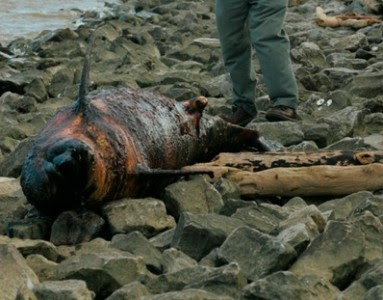courtesy: wikipedia
BP has agreed to pay 5 billion dollars as settlement for reparation for its responsibility in the massive Macondo oil field spill that washed ashore in 5 US states. The company says it has already spent 15 billion in restoration and reparation costs, and is due to appear in court in September if a further settlement is not reached. The settlement is to avoid a further 7.8 billion dollar settlement for private injury claims and other damages, which is now scheduled to go to court in September. BP is scheduled to talk with the justice department in an out of court settlement meeting in this latest case the coming week.
However, almost 4 years later, new signs that containment of the oil spill has failed comes to light in an alarming fashion, according to some sources.
Aside from the more visible signs of pollution at the onset, and soon thereafter, scientists have been weary of declaring the worse of the spill's effects over. In fact, most are concerned about the long term effects of the oil in the water, and even more, of the toxic effects of the oil dispersants that were used to precipitate the oil to the sea bottom at the onset and during the massive spill.
One of the latest news about the possible long term effects comes from the observation of dolphin deaths in the Gulf of Mexico. Between 2000-2009, dolphin deaths were tracked at 25-30 per year. In this two-month period between january and February, 13 dolphins have been found dead.
NOOA has declared 'an unusual mortality event' for cetaceans for this year, in the northern gulf of Mexico.
The news come amidst renewed efforts from BP to reverse the billion dollar penalty meted by the US justice system for the oil spill.
The Gulf of Mexico is one of the ocean's most vital areas. In it are myriad ecosystems, and the waters of the gulf are one of the main food sources for the United States. That notwithstanding, the Gulf of Mexico is the pincushion of oil exploration: more than 4,500 wells are scattered in its waters.
But the case is very complex. And such complexity is an advantage for BP. Indeed, scientists have to log a huge number of data to bring together the cause and effect of the innumerable manifestations that have been attributed to the oil spill.
In the middle of the investigation have been thrown fishermen and private citizens, but also industries and tourism, all clamoring for their share of the reparation money.
The government has laid its foundation to prove that the effects observed on the environment and the population in the 5 affected states, and it is a solid foundation, with supporting physical and scientific evidence. But BP sees in its complexity a way to reduce some of its responsibility.
However, the showdown in court is almost inevitably going to be overshadowed by efforts on both parts to settle out of court for a settlement. If the case goes to court, it could prove disastrous for both parts. If BP wins, the damages could be voided or greatly reduced, leaving the Justice Department empty handed, and setting a worrisome precedent in future cases. If the Justice Department wins, the damages could be in the billions for BP.
But let's return to the ocean fauna for a minute. These are the animals for whom no damages are assessed, although BP has paid the government for costs in ameliorating the effect of the spill and the study of the spill's effects on the environment.
What is at stake here, with a higher mortality in dolphins and whales is that a population of fish as highly developed as a cetacean could be the bellweather of things to come. These large mammals are at the top of the food chain. If they are affected, so is the entire fish population below them in the food chain.
Unfortunately however, the direct impact on these ecosystems might be hard to pin on any one cause. The impact of the flooding from the hurricane, and the high degree of pollutants that wash off from agricultural waste from the rivers that open into the Gulf, will be cited as contributing if not principal causes of the problems observed in the gulf's ecosystems.
And to be truthful, the system is so complex, and there are so many different factors affecting its balance, that these other causes cannot be ruled out completely, making the resolution of the case much more difficult.
The other problem with the attribution of blame for the gulf's woes, is that not a lot of reasearch was done before the spill, so that data prior to the spill is scarce and will make comparison to the condition before the spill difficult at best.
But the public and the people directly impacted by the spill want some sort of justice. They accuse BP of having ruined 300 miles of the best beaches in the world. And the effects will last for decades, if the Exxon Valdez spill is any indication.
More than 10,000 people have refused the limited liability payments offered by BP. These people will now be able to sue BP in a class action suits or individually.
The case however, might never go to court in the wider Justice Department suit. News of a possible settlement next week is making a lot of people, who would like to see BP dragged and shamed in court, uneasy.
One way or the other, BP's reputation has been forever marred by the incident, and it remains to be seen what kind of justice can be had for such an environmental disaster.
Partial sourcing: Guardian/2.23.13/Huff post green/11.15.12




No comments:
Post a Comment